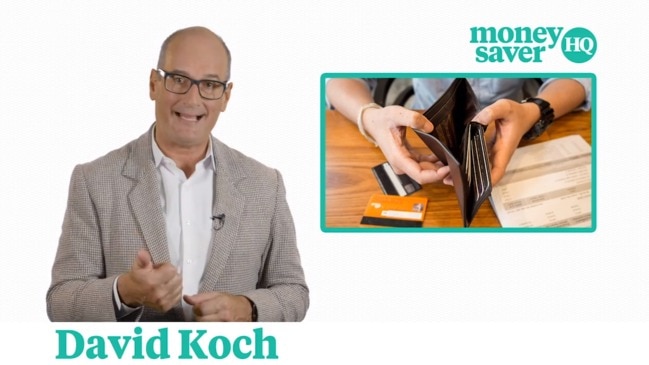The ways women can get financially ahead in their 20s, 30s, 40s, 50s and 60s
Women face many challenges when it comes to managing their money. This is what you need to do in your 20s, 30s, 40s, 50s and 60s to make sure you are in good shape financially.

Saver HQ
Don't miss out on the headlines from Saver HQ. Followed categories will be added to My News.
Women face many challenges when it comes to managing their money — often they earn less than men, live longer and take time out of the workforce to raise a family or care for elderly parents.
For many women, money isn’t front and centre of their minds, and some even rely on a man being their financial plan.
So here’s a guide to helping you on the way to financial happiness and making sure you take control of your finances now and set yourself up for later in life.
Future proofing your finances must be done so your financial situation doesn’t keep you awake at night.

IN YOUR 20s
BAD DEBT
If you already have a credit card that you’re racking up debts on each month and failing to pay it off in full, there’s one simple solution; ditch it.
Most cards attract interest rates above 20 per cent, so your purchases end up being very expensive ones. Buy-now-pay-later schemes like Afterpay and Zip Pay are also booming in popularity and have proven popular among millennials.
While these schemes don’t charge interest, they do slug users with fees if their purchases are not paid off in full by the strict repayment dates.
Be mindful that running up debts and not paying them off can damage your credit file and impact you getting access to a home loan or personal loan down the track.
EDUCATION
It can be difficult to juggle studying and having a part-time or casual job at the same time. But there’s no doubt investing in your education, whether it be going to university, TAFE or trade school, will nearly always pay off.
It will help you establish a career that will hopefully allow you to earn a decent income to live a comfortable lifestyle.
CAR
Remember a car is a depreciating asset, meaning it falls in value over time.
Be careful before you eye off a shiny new car and sign yourself up to a mountain of debt. Often you can snap up a very good second-hand car with low kilometres that’s thousands of dollars cheaper than purchasing a brand new vehicle.
SAVINGS
The sooner you start tucking away cash the better. You may have a big goal in place, for instance, to save a house deposit.
Albert Einstein once described compound interest as the eighth wonder of the world.
Start small, even if it’s $20 a week.
The key is to have your savings amount automatically deducted from your regular pay cycle and moved into a separate savings account.
Don’t touch it and watch it grow.

IN YOUR 30s
PROPERTY
For many Australians there’s nothing better than owning the roof over your head and kissing paying rent goodby, which is seen by many as dead money.
If you’ve managed to save up a decent deposit —— usually at least 10 per cent — you’re in a good position to buy a piece of real estate.
Just remember buying your dream home doesn’t have to be your first purchase. It’s not called a property ladder for nothing.
Once you do get a home loan, make sure you’re on a competitive deal, and for many that means paying an interest rate with a 3 in front.
While interest rates are low, also try and make extra repayments on your loan because rates won’t stay this low forever.
SUPERANNUATION
While there’s no denying the earlier you tip money into your super the better, thanks to compound interest, if you have a home loan this should remain your focus.
Once you are free of your mortgage debt, then you should start putting more into your super.
But don’t forget once you add money into super, you cannot access it until retirement.
The rules around super are constantly changing so who knows what super will look like in decades to come? Whereas with your home loan, if you’re still paying an interest rate around 4 per cent, which most people are, look at scaling down this debt as quickly as possible so you are chipping into the principal and paying less interest as you go. Once this is paid off, then focus on your super.
FAMILY
If you are starting a family or already have children make sure you factor in that it’s likely you’ll end up taking time out of the workforce.
Data from the Australian Institute of Family Studies shows the weekly costs of raising a child can start at $140.
So if you can plan ahead and have a “baby buffer” it will ease financial stress once you leave the workforce.
Overall there’s no doubt the cost of raising children is high.
A 2013 study complied by the national Centre for Social and Economic Modelling with AMP found a typical middle-income famil would spend about $812,000 raising two children from birth to 24.
SCHOOL FEES
These costs will vary significantly depending on whether your child goes to a public or private school. Again, the earlier you start saving for this the better.
Options include tipping money into shares, managed funds, savings accounts, investment bonds or education funds.
Make sure you are aware how much the school you are planning on sending your children to costs annually — it’s not uncommon for private schools to charge more than $20,000 per year.
DISCRETIONARY SPENDING
Leakage spending or discretionary spending on things you can live without is one of the quickest ways to drain money from your hip pocket.
Check your latest bank statements or log into your online banking and see what discretionary items you’re spending on — things such as takeaway coffees, Uber rides and food-delivery services.
Many of these expenses can easily be wound back on or cut out altogether with some simple planning.
For example, catching public transport instead of an Uber or making coffee at your workplace instead of buying it.
Checking direct debits is also crucial because you may be paying for things you no longer realised.
Splashing money weekly on lunch also quickly drains the budget and this is an expense that can easily be reduced by making your own cut lunch each day.

IN YOUR 40s
Educating your children and paying down the mortgage will be top of the priority list for most people in their 40s, but already looking to retirement should be on your radar.
INVESTING
Tribeca Financial’s chief executive officer Ryan Watson says investing outside of your superannuation should start to be a focus.
“The earlier you can start investing the better, that is the power of compound interest,” he says.
But he warned against tipping any extra cash straight into your super fund.
“Putting additional money into superannuation in your 40s can be problematic because you won’t be able to access it for at least another 20 years,” Mr Watson says.
Watson says time “is always of the essence for any woman in their 40s” when investing, so they should consider investment options such as low cost, index funds offered by mobs including Vanguard.
“Investing starts by creating a surplus in your monthly household budget,” Watson says.
“This money invested each month will add up to a large amount over a 10 to 20 year period.”
SUPERANNUATION
The amount of money Australians need in retirement is large so it’s good to do a check on your super to make sure your retirement savings are in good shape.
According to the Association of Superannuation Funds of Australia’s retirement standard, singles should have $540,000 once they stop work and couples should have $640,000. This is presuming you own your home outright and are also relatively healthy.
To find out if your super balance is on track to have a comfortable retirement visit superguru.com.au.
MORTGAGE
Hopefully you’ve made some serious headway into your mortgage and have made a dent in the principal owed on the loan.
The more you tip in now the quicker you will bring down the principal amount owed and consequently pay less in interest charges.

IN YOUR 50s
For most people this is starting to get to the tail end of your children living at home, so now the focus is going to shift towards your own financial future.
RETIREMENT
If you haven’t started thinking to seriously about retirement you should definitely start now. This may even mean making a trip to see a financial adviser or ringing up your super fund to find out your status quo.
The Australian Institute of Superannuation Trustees’ chief executive officer Eva Scheerlinck says you should make sure you have consolidated multiple accounts, if you have them, and start throwing more money into your fund if you can.
“It makes sense at any age to consolidate super funds to save on fees and extra costs,” she says.
“In addition to making extra voluntary contributions where you can, it’s worth considering whether you can reduce your insurance.
“Empty-nesters who have sizeable super balance and who have paid off their mortgage may no longer need the same level of insurance they had in the 30s and 40s.”
DEBT
You should be focusing on wiping any non-deductible debt such as personal loans and credit cards.
The last thing you want as you near your retirement years is to be saddled with debts you cannot pay off.
If you have deductible debt, such as a property investment loan, that is OK, but your mission should ultimately be to have your debts paid down so you can remove any chance of being over leveraged.
IN YOUR 60s
TRANSITION TO RETIREMENT
The end of your working life may be getting closer, so transitioning to retirement will be on the horizon for most.
Similar to those in their 50s, ensuring you have minimal debt is paramount to setting yourself up to live a comfortable retirement.
Some people may choose to keep working while drawing down on some of their super benefits.
This allows workers to reduce their hours and possibly salary sacrifice into super to save on tax.
Evan Lucas from robo adviser InvestSMART says for those closer to retirement who had not enjoyed tucking away super their entire working lives — compulsory super was only introduced in 1992 — they should think about how to boost their balances.
“There are several incentives to start trying to top up your super balance so you can work out how to get prepared and maximise the tax benefits,” he says.
“You need to think about when you get close to retirement, whether you can start subsidising your income with some form of investments
He also encouraged those still with a mortgage to pay it down, get their credit card balance down to zero and take a serious look at your overall monetary position.
READ MORE:
FIND THE CHEAPEST PETROL CLOSEST TO YOU
10 THINGS I DID TO SAVE A HOUSE DEPOSIT
WHAT TO DO BEFORE OPENING A JOINT ACCOUNT
Lucas added that if you have positively geared debts, such as investment properties or shares, this isn’t a problem, but carry non-tax deductible debts is something which should be avoided at all costs at this stage of life.


